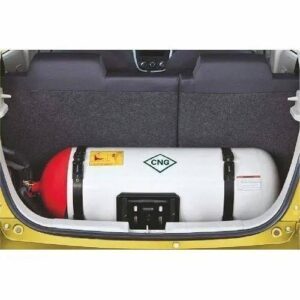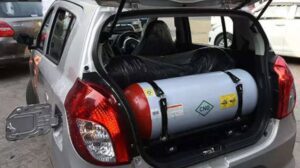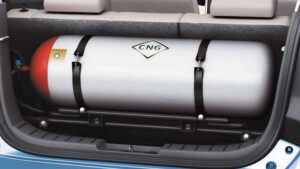How to Convert a Petrol Engine to CNG
Vehicle exhaust fumes have become one of the leading causes of rising air pollution, particularly in major cities. People and businesses alike are looking for cleaner and more sustainable alternatives to meet their energy demands as environmental concerns gain importance.
Converting petrol-powered engines to Compressed Natural Gas (CNG) is one practical option to lower emissions and enhance environmental impact in the automotive sector.

CNG is a fuel that burns cleaner than other types and greatly reduces hazardous pollutants, making it a desirable choice for people trying to make their cars more environmentally friendly. The government is encouraging electric vehicles and has tightened the BS6 emission standards to reduce pollution. Compressed natural gas, sometimes known as CNG, is a green fuel that produces fewer exhaust gases. In comparison to traditional fuels, it is also effective. Indians favor CNG vehicles because of their affordable operating costs. You may find a thorough tutorial on how to convert your automobile to run on CNG in this article.
How Do You Convert a Gasoline Car to Run on CNG?
India’s preference for CNG vehicles has grown as a result of the sharp rise in fuel costs. Additionally, several automakers include factory-installed CNG kits with their vehicles. Cost is merely one factor to consider; CNG is also gasoline that is better for the environment because it emits fewer greenhouse emissions than traditional fuel. Because electric automobiles are currently more expensive, the only practical possibilities are CNG vehicles or converting gasoline vehicles to CNG.
What does it matter if you already have a car and want to switch to CNG fuel? Can a gasoline-powered car be converted to run on compressed natural gas? The conversion from gasoline to compressed natural gas is difficult, but the answer is YES. When selecting an aftermarket CNG kit and installing the kit, caution must be exercised. Let’s examine the conditions and procedures required for converting a gasoline vehicle to a CNG vehicle.
Conditions Before Installing a CNG Kit

Here are the prerequisites for converting gasoline-powered vehicles to CNG vehicles:
- Verify that the CNG kit is compatible with your gasoline vehicle.
- Buy a genuine CNG kit from a licensed retailer.
- Make sure that your car has all brand-new components installed.
- Before installing the CNG tank inside the vehicle, hydro-test it for leaks.
CNG installation
Installing the CNG kit in your car is the next step once you’ve taken care of the prerequisites. It is a difficult process that needs to be carried out by an expert. It is not advised that you install by yourself; if you do, follow an expert’s instructions.
The parts needed to convert a gasoline vehicle to a CNG vehicle are listed below:
- pressure limiter
- Gas/Air Mixer
- Filling valve for CNG
- elevated pressure line
- Valves
- fuel cell
- Switch (to alternate between gasoline and CNG)
- Manometer
- heating apparatus
- Emulator
The conversion from gasoline to compressed natural gas is finished after the installation of the aforementioned parts. But only half of the job is finished. After installation, check the gasoline lines for leaks, see whether the pressure regulator has any leaks, and confirm that all the parts are properly installed and fastened. Start the engine once you’ve finished the examination. But keep in mind to start the engine in gasoline mode before switching to CNG fuel.
CNG in Automobiles
As previously indicated, several automakers in India offer CNG versions of their well-known models, and such vehicles come with factory-installed CNG kits. Aftermarket or retrofitted CNG kits are the second category of CNG equipment. These kits are available from a licensed retailer. The details of both CNG kits are listed below:
Integrated CNG Kit
- The factory of the automaker is where it is installed.
- The CNG kit was created exclusively for a certain model of car and is incompatible with any other make or model.
- Although more expensive than aftermarket systems, these CNG kits are safer.
- Since the CNG kit was installed at the factory, your car’s warranty is unaffected.
Commercial CNG Fuel Kit
- Any gasoline-powered vehicle is compatible with the aftermarket kit.
- These are universal kits that can be installed based on the vehicle’s design.
- Cheaper than factory-fitted CNG kits are aftermarket CNG kits.
- The warranty of the vehicle may be void if a CNG kit is retrofitted.
- Compared to factory-fitted kits, these kits offer less safety.
CNG Maintenance
Greener CNG vehicles have minimal operating costs. For the car to run smoothly, however, the CNG fuel system must be maintained. So, here are some pointers to help you maintain the condition of your CNG vehicle:
- Since the CNG kit was installed at the factory, your car’s warranty is unaffected.
- Use engine oil that is the proper grade and CNG fuel-compatible.
- Perform routine engine inspections because CNG fuel is prone to wear and strain on the engine.
- When using CNG fuel, avoid overrevving or pushing the engine. Expecting a power drop is normal.
- The use of AC increases the engine’s workload. CNG may thus have an impact on the cooling system.
- Every so often, inspect the gasoline lines for leaks.
- Make sure all parts are functioning properly.
Checklist for Before CNG Conversion

Here are some things to think about before considering converting your gasoline vehicle to a CNG vehicle:
- Check your car’s compatibility with CNG fuel to see whether it is. In general, CNG kits are incompatible with older vehicles.
- Licensing: The next step is to obtain government approval if your car is compatible with the CNG fuel system. To utilize the CNG kit in your car, you must also modify the fuel type on the registration certificate. It takes a long time to complete. However, installing a CNG system in a brand-new vehicle makes approval much simpler.
- authentic CNG Kits: To be sure the equipment is authentic, buy a branded CNG kit from a licensed vendor. Don’t purchase one from a nearby merchant.
- Installation and maintenance costs will add up if you decide to convert your gasoline vehicle to run on compressed natural gas. The good news is that because CNG cars have minimal operating costs, you can recoup the expenditure over time. On the other hand, using CNG fuel may have negative long-term effects on the engine and raise maintenance costs.
- Performance: After converting to CNG fuel, you’ll notice a decrease in power. Engine life may be shortened if regular maintenance is not performed. Therefore, CNG-powered engines need to be properly maintained.
- Availability: Unlike gasoline and diesel filling stations, CNG filling stations are not located everywhere. When taking a long journey, you might have to consider this and may need to bring a fuel can as a backup.
- If you want to convert your gasoline-powered vehicle to run on compressed natural gas, the insurance price will go up. The insurance premium is determined by several variables, including fuel type. The expense of maintaining a CNG vehicle is significant. Consequently, the cost of auto insurance goes up. But only the Comprehensive Car Insurance Plan is covered by it.
Benefits of CNG Use
These are CNG’s benefits:
- Environmentally friendly: CNG is a green fuel since it emits fewer greenhouse emissions than its traditional competitors.
- Low Operating Cost: Because CNG is less expensive than gasoline and diesel, operating a CNG vehicle is inexpensive. When it comes to fuel efficiency, CNG fuel also performs admirably.
- Dual Fuel: A CNG car’s ability to also run on gasoline is undoubtedly its most important benefit. Therefore, you may easily manage my filling station if you cannot discover a CNG filling station.
Cons of Converting from Petrol to CNG
The downsides of a CNG automobile are listed below:
- Restricted Availability: The restricted number of CNG refueling stations is one of the main drawbacks of a CNG vehicle. CNG filling stations are only available in a few places, but gasoline and diesel refueling stations may be found all across the nation.
- Reduced Space: The CNG tank is typically installed in the car’s boot. As a result, you must make a compromise on boot capacity to make room for the CNG kit. Additionally large and adding to your vehicle’s curb weight is the CNG fuel tank. The added weight will affect the car’s overall performance.
- Installation Fees: Because aftermarket CNG conversion kits are more expensive, the initial outlay is higher. When compared to their conventional equivalents, the CNG-equipped cars from the factory are also more expensive.
- Safety: CNG fuel is less secure than gasoline. Being a gaseous fuel, there is a considerable chance of leakage, which might cause an explosion.
FAQ on How to change Petrol to CNG
1. Why should I switch from a gasoline to a CNG vehicle?
There are various advantages to changing your gasoline vehicle to a CNG vehicle. Since CNG is a cleaner fuel than gasoline, it emits fewer dangerous pollutants including carbon monoxide and nitrogen oxides. Additionally, CNG is frequently less expensive than gasoline, which over time can result in significant fuel expense savings.
2. Can any gasoline-powered vehicle be made CNG-ready?
Not all gas-powered vehicles can be made to run on CNG. The conversion procedure is frequently appropriate for particular automobiles with internal combustion engines. To find out if your car is suitable for conversion, you must speak with an experienced mechanic or conversion specialist.
3. Is it allowed to convert my automobile to CNG?
Different nations and regions have different laws regarding CNG conversions for vehicles. For reasons of safety and emissions, there may be laws and guidelines governing CNG conversions in some locations. Verify that the conversion complies with all local laws and ordinances before moving forward.
4. What is the price of converting a gasoline-powered automobile to run on CNG?
The brand and model of your vehicle, the conversion kit utilized, and labor charges can all affect the cost of conversion. CNG conversions typically cost between a few thousand and several thousand dollars. Although the upfront cost can appear high, long-term fuel cost savings might help defray the conversion costs.
